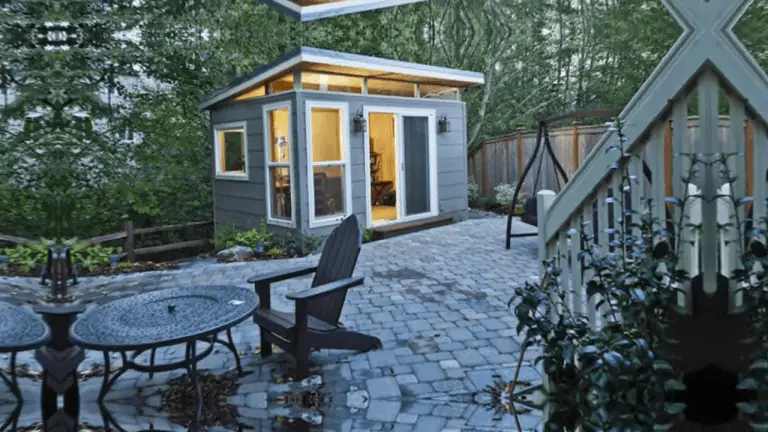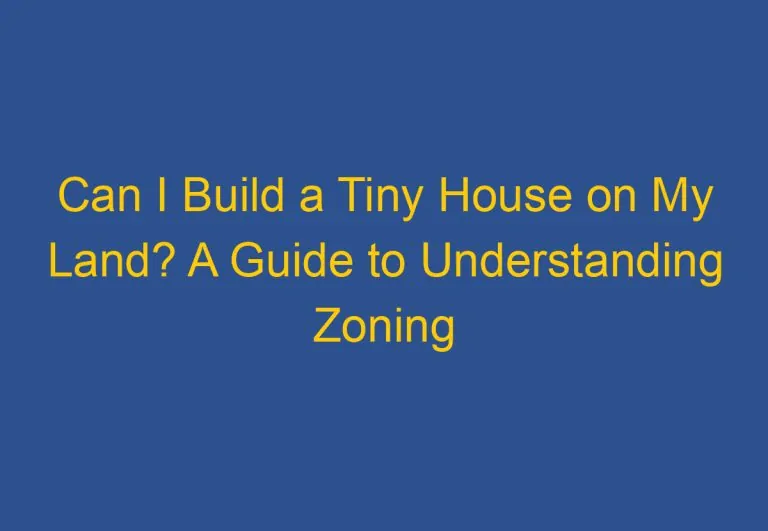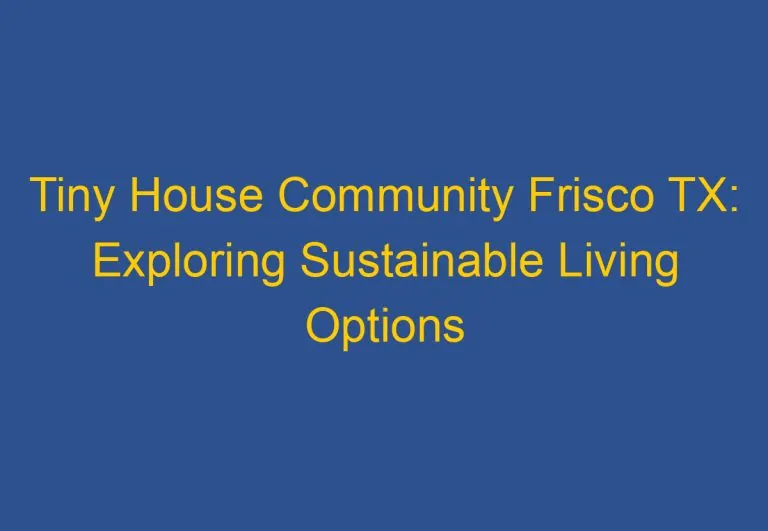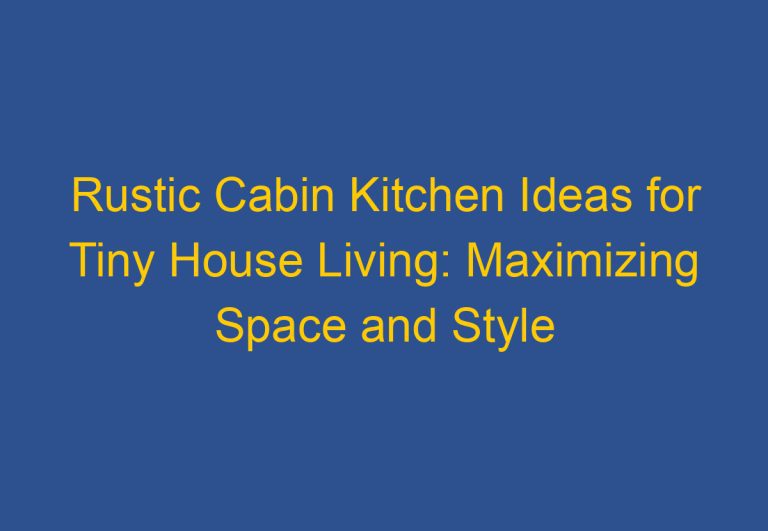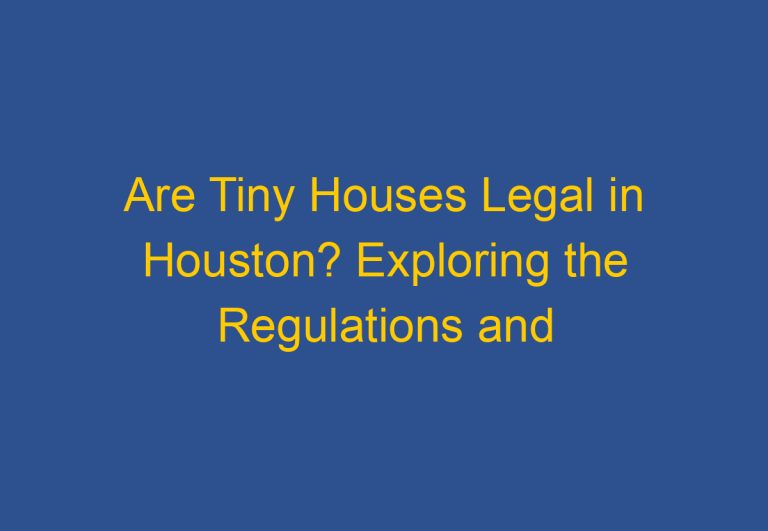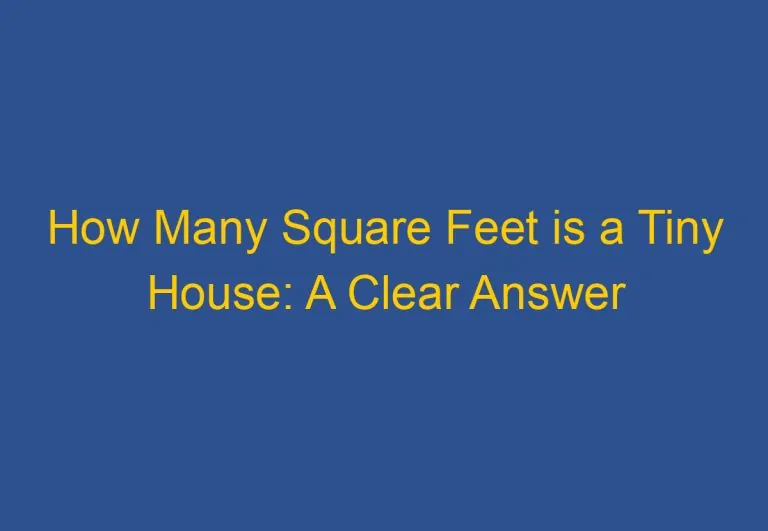Are Tiny Houses Legal in Alabama? A Comprehensive Guide to Alabama’s Tiny House Laws
Tiny houses have become a popular trend in recent years, with many people seeking a simpler and more sustainable way of living. However, the legality of tiny houses varies from state to state and even from county to county. This has left many people wondering whether tiny houses are legal in Alabama.
Determining the legality of tiny houses in Alabama is not a straightforward issue with a simple yes or no response. The regulations surrounding tiny houses vary across the state, with different counties and cities having their own rules and zoning requirements. In Alabama, the rules and regulations around tiny houses are not straightforward because a statewide building code has not yet been developed.
For those interested in building or buying a tiny house in Alabama, it is important to research the regulations and requirements specific to the area where they plan to live. While some counties have amended their building laws to accommodate tiny houses, others have not yet done so. It is also important to consider the costs associated with building or buying a tiny house in Alabama, which can range from $20,000 to $150,000.
Legality and Zoning Regulations for Tiny Houses in Alabama
Statewide Building Codes and the International Residential Code
Determining the legality of tiny houses in Alabama can be a complex and confusing process, as a statewide building code has not yet been developed. However, the International Residential Code (IRC) has been adopted by several counties and municipalities in Alabama, including Jefferson County and Baldwin County. This code provides specific guidelines for the construction of tiny homes, including safety regulations and homeowner compliance.
Zoning Laws and Local Ordinances
Zoning laws and local ordinances also play a significant role in determining the legality of tiny houses in Alabama. In Alabama, tiny house regulations vary by county and municipality. Some areas have specific rules about the minimum size (400 square feet), while others require a permit for temporary or permanent placement for zoning restrictions and requirements for water, sewage, and electrical hookups.
Tiny House Communities and Zoning Restrictions
Tiny house communities have become increasingly popular in Alabama, but zoning restrictions can make it difficult to find a suitable location. Some counties, such as Jefferson County, have adopted Appendix Q of the IRC, which provides specific zoning regulations for tiny houses. However, other counties in Alabama may not have specific regulations for tiny houses, making it difficult for homeowners to comply with building and zoning codes.
Overall, the legality of tiny houses in Alabama depends on several factors, including the specific guidelines set forth by local authorities, zoning codes, and building codes. It is important for homeowners to research the rules and regulations in their specific area before beginning construction on a tiny house.
Building Requirements and Living in a Tiny House
Living in a tiny house is becoming increasingly popular, and Alabama is no exception. However, building and living in a tiny house in Alabama requires careful consideration of the state’s regulations and building codes.
Structural Standards and Building Code Compliance
Alabama does not have a statewide building code for tiny houses, so building regulations vary across the state. Tiny house builders must ensure that their structures meet the local building codes, zoning laws, and safety standards. The tiny house must also be built on a foundation and comply with the minimum square footage requirements set by the local authorities.
Utility Connections and Safety Considerations
Tiny houses have unique utility requirements, and builders must ensure that their structures meet the plumbing and electrical codes set by the National Electrical Code (NEC). Tiny houses must also have proper ventilation, heating, and windows to ensure safety and comfort. Additionally, tiny houses must have stairs or ladders that meet the safety standards and provide easy access to the loft or sleeping area.
Lifestyle and Community Aspects of Tiny House Living
Living in a tiny house requires a minimalist lifestyle and a willingness to downsize. Tiny house owners must also consider the community and zoning restrictions in their area. Alabama allows tiny houses as accessory dwelling units (ADUs) on private properties, but they must comply with the local zoning laws and property taxes. Tiny house owners must also consider the costs of building, maintaining, and living in a tiny house.
In conclusion, building and living in a tiny house in Alabama requires careful planning, compliance with building codes and regulations, and a willingness to embrace a minimalist lifestyle. Tiny house owners must ensure that their structures meet the structural standards, utility connections, and safety considerations set by the local authorities. They must also consider the community and zoning restrictions and the costs of building and living in a tiny house.
Frequently Asked Questions
What are the zoning regulations for tiny houses in Alabama?
The zoning regulations for tiny houses in Alabama vary by county, and some cities may have their own regulations as well. It is important to check with the local zoning authority to determine the specific requirements for the area in which you plan to build or park a tiny house.
Can I legally build a tiny house on my own land in Alabama?
Yes, you can legally build a tiny house on your own land in Alabama, as long as you comply with the applicable zoning regulations and building codes. However, it is important to note that some counties may have minimum square footage requirements for residences.
What is the minimum square footage required for a residence in Alabama?
The minimum square footage required for a residence in Alabama varies by county. Some counties have no minimum square footage requirements, while others may require a minimum of 1,000 square feet or more. It is important to check with the local zoning authority to determine the specific requirements for the area in which you plan to build or park a tiny house.
Are there any specific codes or standards for tiny houses in Alabama?
There is no statewide building code for tiny houses in Alabama, but some counties and cities may have their own building codes and standards. It is important to check with the local building authority to determine the specific requirements for the area in which you plan to build or park a tiny house.
Is it possible to rent a tiny house in Alabama?
Yes, it is possible to rent a tiny house in Alabama, but it is important to ensure that the rental is in compliance with the applicable zoning regulations and building codes. Additionally, it is important to ensure that the rental agreement is legally binding and protects the rights of both the renter and the landlord.
Does Alabama recognize tiny houses as accessory dwelling units (ADUs)?
There is no statewide recognition of tiny houses as accessory dwelling units (ADUs) in Alabama, but some counties and cities may allow them as ADUs under certain conditions. It is important to check with the local zoning authority to determine the specific requirements for the area in which you plan to build or park a tiny house.





